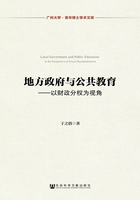
Abstract
Fiscal decentralization is popular all over the world, and that of China is more significant. The characteristics of fiscal decentralization in China are the decentralization in economy and the direct management in politics, and local government under the constraint of fiscal decentralization is affected by both the economy and the politics. Local government focuses on the local economic growth, and government behaviors mainly involve the local government competition and the government management. In order to occupy more resources, local government started to compete and improve the government management to raise the allocation efficiency. Education is the basis of national development with social and economic values, while the public education as quasi-public goods makes the residents get the maximum education. Government has the obligation to allocate educational resources and supply enough public education. This paper aims to study the relationship between the local government and the public education in China's fiscal decentralization, and explores how the local government affects the public education.
As the development of the fiscal system in China, the behavior characteristics of local government change in different stages, and the public education is one of the most important components. On the basis of the new institutional economics, we explore the mechanism between the local government behavior and the public education. Due to the imperfect property right, local governments started to compete to get the whole property right. Additionally, due to the achievement assessment,local governments preferred to raise the economics, but ignored the improvement of public education. Furthermore, the externality of institutional change offering the institutional protection to the local government under the constraint of fiscal decentralization makes the government competition more serious. It is found that there is the nonrational behavior during the period of competition, and the deletion in the public education becomes serious. In order to improve the efficiency of public education, government tried to reduce the cost of public education and improve the quality of government management. Based on a theoretical model, we found that the local government competition undermined the public education, while the local government management improved the public education.
To evidence the results mentioned above, we use the SBM directional distance function to measure the efficiency of public education and explore the sources of inefficiency for 31 provinces in China over the period of 2005-2011. It is found that the higher education is the major source to the inefficiency. Furthermore, we explore and decompose the efficiency of higher education, and it is found that the university research output is the major source of the efficiency of higher education. With a comparison among different areas, the middle area has the higher efficiency scores in both public education and higher education, and the east area is the second, while the west area is the weakest. In terms of the university research output, the efficiency score of the east area is the highest, while that of the middle area is lower, and that of the west is still the worst. On the basis of the measurements above, we analyze the effect of local government behavior to the local education under the constraint of fiscal decentralization. We classify one appropriate proxy variable for the local government competition, and the effort against corruption and the financial burden rate are employed for the local government management. The effort against corruption is positive significantly to the public education, whereas the financial burden is negative to that, and it implies that the local government management could improve the efficiency of public education. Regarding the areas, the influence of local government competition in the east area is the most significant, and that of the west area is the worst. However, the influence of local government composition in the east area is not significant, while the effort against corruption and the financial burden rate in the middle area are the significant to the public education. Furthermore, we explore the effects of the local government behavior to the higher education and university research output. It is found that the financial burden rate is not significant to the higher education, and the local government competition is not significant to the university research output.
Keywords: Fiscal Decentralization; Local Government's Behavior;Public Education